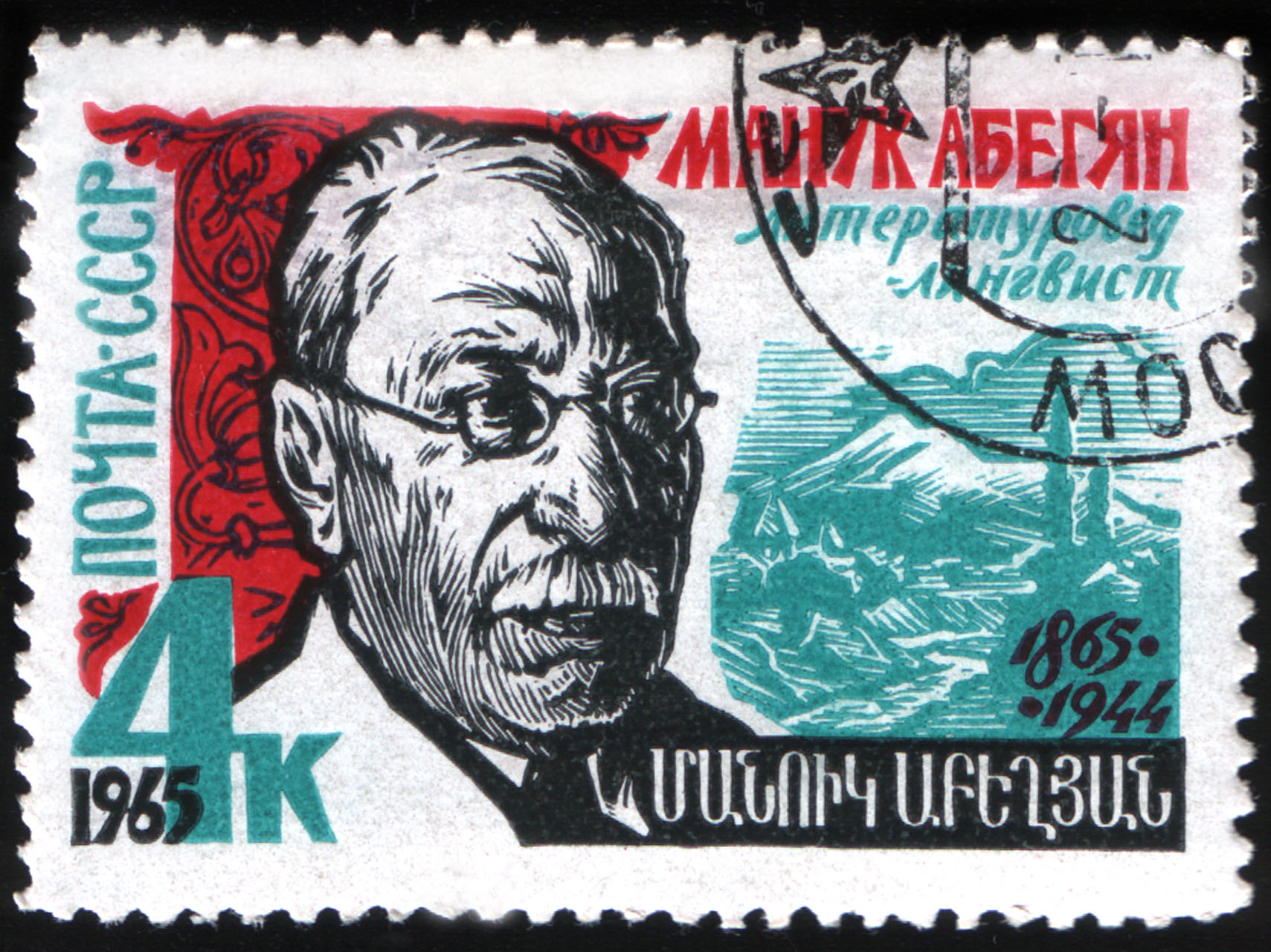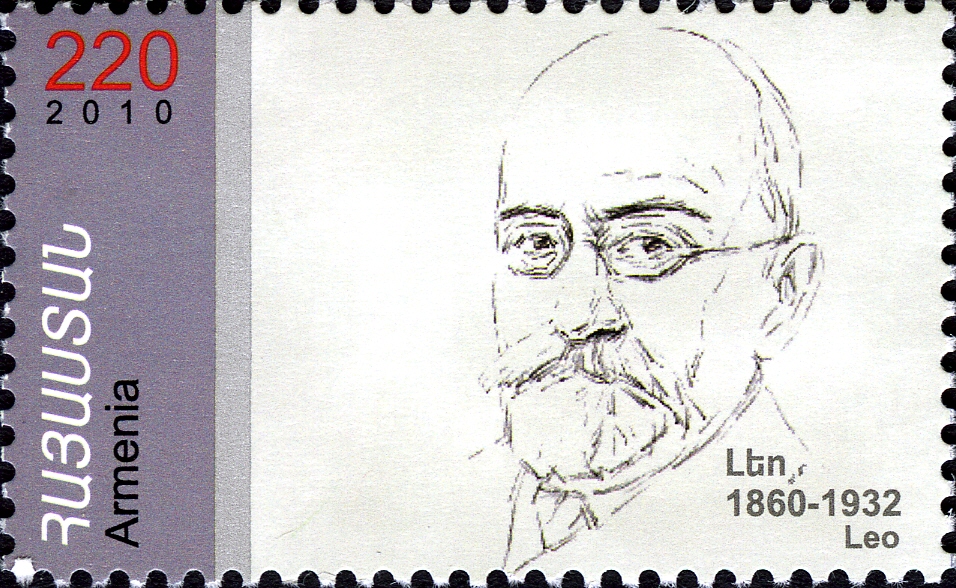|
Yervand Lalayan
Yervand Lalayan ( hy, Երվանդ Լալայան, 1864 – 24 February 1931) was an Armenian ethnographer, archaeologist, folklorist. He was also the founder and the first director of the History Museum of Armenia from 1919 to 1927. Biography In 1885 he left Tiflis's Nersisian School and worked in Akhaltsikhe, Akhalkalaki, and Alexandropol as a teacher. In 1894 ending the faculty of social sciences in the University of Geneva. Receiving the level of Candidate of sociological sciences, he worked for the Mkhitarians of Venice. Returning to Armenia, in 1895-1897 he worked in the diocesan school of Shusha. When here, and consulting with the notable scholars (Manuk Abeghian, T. Toramian, Hrachia Acharian, Leo, Melikset bek, S. Lisitsyan, Kh. Samuelyan, S. Zelinski, etc., he founded the periodical '' Azgagrakan Handes'' ( hy, Ազգագագրական Հանդես, ''"Ethnographic Magazine"'') in 1896. On November 21, 1900 he founded the Armenian Ethnographic publishing house in ... [...More Info...] [...Related Items...] OR: [Wikipedia] [Google] [Baidu] |
Gyumri
Gyumri ( hy, Գյումրի, ) is an urban municipal community and the second-largest city in Armenia, serving as the administrative center of Shirak Province in the northwestern part of the country. By the end of the 19th century, when the city was known as Alexandropol,; hy, Ալեքսանդրապոլ it became the largest city of Russian-ruled Eastern Armenia with a population above that of Yerevan. The city became renown as a cultural hub, while also carrying significance as a major center of Russian troops during Russo-Turkish wars of the 19th century. The city underwent a tumultuous period during and after World War 1. While Russian forces withdrew from the South Caucasus due to the October Revolution, the city became host to large numbers of Armenian refugees fleeing the Armenian Genocide, in particular hosting 22,000 orphaned children in around 170 orphanage buildings. It was renamed to Leninakan; russian: Ленинакан during the Soviet period and became a major i ... [...More Info...] [...Related Items...] OR: [Wikipedia] [Google] [Baidu] |
Manuk Abeghian
Manuk Abeghian ( hy, Մանուկ Աբեղյան, , alternatively Manouk Abeghian, or Manuk Abeghyan, March 15, 1865 – September 26, 1944) was a scholar of Armenian literature and folklore. He is best remembered as the main designer of the reformed Armenian orthography used in Armenia to this day. Abeghian was born in 1865 in the village of Tazakand (modern-day Babek, Azerbaijan; historically known by its inhabitants as Astapat or Astabad, after the nearby ruined medieval village) in the Nakhichevansky Uyezd of the Erivan Governorate of the Russian Empire․ He began teaching at Yerevan State University in 1923, in the first years after the university was founded. He was a member of the Armenian National Academy of Sciences. He is the author of a comprehensive history of Armenian literature, the Russian translation of which is titled ''Istoriya drevnearmyanskoi literatury'', and of a volume on Armenian folklore, the German translation of which is entitled, ''Der Armenische ... [...More Info...] [...Related Items...] OR: [Wikipedia] [Google] [Baidu] |
Soviet Archaeologists
This list of Russian historians includes the famous historians, as well as archaeologists, paleographers, genealogists and other representatives of auxiliary historical disciplines from the Russian Federation, the Soviet Union, the Russian Empire and other predecessor states of Russia. Alphabetical list __NOTOC__ A * Friedrich von Adelung (1768-1843), historian and museologist, researched the European accounts of the Time of Troubles * Valery Alekseyev (1929-1991), anthropologist, proposed ''Homo rudolfensis'' * Mikhail Artamonov (1898-1972), historian and archaeologist, founder of modern Khazar studies, excavated a great number of Scythian and Khazar kurgans and settlements, including the fortress of Sarkel *Artemiy Artsikhovsky (1902-1978), archaeologist, discoverer of birch bark documents in Novgorod B *Vasily Bartold (1869-1930), turkologist, the ''"Gibbon of Turkestan"'', an archaeologist of Samarcand *Konstantin Bestuzhev-Ryumin (1829-1897), 19th-century historian and pale ... [...More Info...] [...Related Items...] OR: [Wikipedia] [Google] [Baidu] |
University Of Geneva Alumni
A university () is an institution of higher (or tertiary) education and research which awards academic degrees in several academic disciplines. Universities typically offer both undergraduate and postgraduate programs. In the United States, the designation is reserved for colleges that have a graduate school. The word ''university'' is derived from the Latin ''universitas magistrorum et scholarium'', which roughly means "community of teachers and scholars". The first universities were created in Europe by Catholic Church monks. The University of Bologna (''Università di Bologna''), founded in 1088, is the first university in the sense of: *Being a high degree-awarding institute. *Having independence from the ecclesiastic schools, although conducted by both clergy and non-clergy. *Using the word ''universitas'' (which was coined at its foundation). *Issuing secular and non-secular degrees: grammar, rhetoric, logic, theology, canon law, notarial law.Hunt Janin: "The university i ... [...More Info...] [...Related Items...] OR: [Wikipedia] [Google] [Baidu] |
People From Gyumri
A person ( : people) is a being that has certain capacities or attributes such as reason, morality, consciousness or self-consciousness, and being a part of a culturally established form of social relations such as kinship, ownership of property, or legal responsibility. The defining features of personhood and, consequently, what makes a person count as a person, differ widely among cultures and contexts. In addition to the question of personhood, of what makes a being count as a person to begin with, there are further questions about personal identity and self: both about what makes any particular person that particular person instead of another, and about what makes a person at one time the same person as they were or will be at another time despite any intervening changes. The plural form "people" is often used to refer to an entire nation or ethnic group (as in "a people"), and this was the original meaning of the word; it subsequently acquired its use as a plural form of per ... [...More Info...] [...Related Items...] OR: [Wikipedia] [Google] [Baidu] |
Armenian Scientists
Armenian may refer to: * Something of, from, or related to Armenia, a country in the South Caucasus region of Eurasia * Armenians, the national people of Armenia, or people of Armenian descent ** Armenian Diaspora, Armenian communities across the world * Armenian language, the Indo-European language spoken by the Armenian people ** Armenian alphabet, the alphabetic script used to write Armenian ** Armenian (Unicode block) * Armenian Apostolic Church * Armenian Catholic Church People * Armenyan, or in Western Armenian, an Armenian surname **Haroutune Armenian (born 1942), Lebanon-born Armenian-American academic, physician, doctor of public health (1974), Professor, President of the American University of Armenia **Gohar Armenyan (born 1995), Armenian footballer **Raffi Armenian (born 1942), Armenian-Canadian conductor, pianist, composer, and teacher Others * SS ''Armenian'', a ship torpedoed in 1915 See also * * Armenia (other) * Lists of Armenians This is a list o ... [...More Info...] [...Related Items...] OR: [Wikipedia] [Google] [Baidu] |
1931 Deaths
Events January * January 2 – South Dakota native Ernest Lawrence invents the cyclotron, used to accelerate particles to study nuclear physics. * January 4 – German pilot Elly Beinhorn begins her flight to Africa. * January 22 – Sir Isaac Isaacs is sworn in as the first Australian-born Governor-General of Australia. * January 25 – Mohandas Gandhi is again released from imprisonment in India. * January 27 – Pierre Laval forms a government in France. February * February 4 – Soviet leader Joseph Stalin gives a speech calling for rapid industrialization, arguing that only strong industrialized countries will win wars, while "weak" nations are "beaten". Stalin states: "We are fifty or a hundred years behind the advanced countries. We must make good this distance in ten years. Either we do it, or they will crush us." The first five-year plan in the Soviet Union is intensified, for the industrialization and collectivization of agriculture. * February 10 – O ... [...More Info...] [...Related Items...] OR: [Wikipedia] [Google] [Baidu] |
1864 Births
Events January–March * January 13 – American songwriter Stephen Foster ("Oh! Susanna", "Old Folks at Home") dies aged 37 in New York City, leaving a scrap of paper reading "Dear friends and gentle hearts". His parlor song " Beautiful Dreamer" is published in March. * January 16 – Denmark rejects an Austrian-Prussian ultimatum to repeal the Danish Constitution, which says that Schleswig-Holstein is part of Denmark. * January 21 – New Zealand Wars: The Tauranga campaign begins. * February – John Wisden publishes '' The Cricketer's Almanack for the year 1864'' in England; it will go on to become the major annual cricket reference publication. * February 1 – Danish-Prussian War (Second Schleswig War): 57,000 Austrian and Prussian troops cross the Eider River into Denmark. * February 15 – Heineken brewery founded in Netherlands. * February 17 – American Civil War: The tiny Confederate hand-propelled submarine ''H. L. Hunl ... [...More Info...] [...Related Items...] OR: [Wikipedia] [Google] [Baidu] |
Armenian Soviet Encyclopedia
The ''Armenian Soviet Encyclopedia'' ( hy, Հայկական սովետական հանրագիտարան, ''Haykakan sovetakan hanragitaran''; ASE) publishing house was established in 1967 as a department of the Institute of History of the Armenian Academy of Sciences under the presidency of Viktor Hambardzumyan (1908–1996), co-edited by Abel Simonyan (1922–1994) and Makich Arzumanyan (1919–1988). In 1988–1999 the editor-in-chief was Konstantin Khudaverdyan (1929–1999) and since 1999 Hovhannes Aivazyan. It produced the ''Soviet Armenian Encyclopedia'' (also rendered ''Armenian Soviet Encyclopedia''; '' hy, Հայկական Սովետական Հանրագիտարան'', ', ''russian: Армя́нская сове́тская энциклопе́дия'', ' ) from 1974–1986. The AE publishing house also edited a children's encyclopedia, ''Who is it? What is it?'' ( hy, italic=yes, Ո՞վ է, Ի՞նչ է) in 4 volumes (1984–87), the ''Russian-Armenian Polytechnical Dic ... [...More Info...] [...Related Items...] OR: [Wikipedia] [Google] [Baidu] |
Azgagrakan Handes
''Azgagrakan Handes'' ( hy, Ազգագրական հանդէս, ''"Ethnographic Magazine"'') was an Armenian-language ethnological journal published between 1895 and 1916 by Yervand Lalayan. 26 volumes of the journal were published, initially in Shusha and then in Tiflis. The main topics of journal were Armenian ethnology, philology, archeology, architecture, history and art. As well as Lalayan, noted contributors included Toros Toramanian, Garegin Hovsepian, Garegin Levonyan, and others. See also *Armenian studies Armenian studies or Armenology ( hy, հայագիտություն, ) is a field of humanities covering Armenian history, language and culture. The emergence of modern Armenian studies is associated with the foundation of the Catholic Mechitarist o ... LinksAn archive of the journal{{Reflist Armenian journals ... [...More Info...] [...Related Items...] OR: [Wikipedia] [Google] [Baidu] |
Arakel Babakhanian
Arakel Grigori Babakhanian ( hy, Առաքել Գրիգորի Բաբախանյան; – 14 November 1932), commonly known by his pen name Leo ( hy, Լեո), was an Armenian historian, writer, critic and professor of Yerevan State University. He is best known for authoring a multi-volume work on the history of Armenia. Leo adopted a critical stance in examining some of the most important issues in Armenian history, literature and contemporary problems of the early 20th century. Harutyunian, Sh. R. and A. K. Ohanian. s.v.Leo" Armenian Soviet Encyclopedia. Yerevan: Armenian Academy of Sciences, 1978, vol. 4, pp. 566-567. Biography Leo was born on 14 April 1860 in the city of Shusha/Shushi in the region of Mountainous Karabakh, then a part of the Russian Empire. He was one of several children of Grigor Babakhanian, a tailor (later bellringer) of modest means. He graduated from the local school there in 1878. Due to the death of his father in 1879, Leo was unable to attend univer ... [...More Info...] [...Related Items...] OR: [Wikipedia] [Google] [Baidu] |



_1938.jpg)



